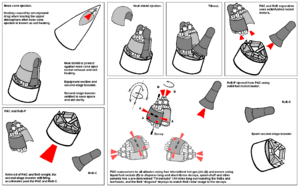Chevaline Re-entry Body

The Chevaline Re-entry Body (ReB) was the Re-entry vehicle (RV), of the British Chevaline warhead development of the Royal Navy's UGM-27 Polaris missile system. Chevaline was devised as an answer to the improved Soviet defences around Moscow, the system being intended to increase the probability of at least one warhead penetrating the city's Anti-ballistic missile (ABM) defences, something which the Royal Navy's earlier Polaris RVs were thought to be unlikely to do. The Chevaline system was in service from 1982 to 1996, when it was replaced by Trident D5.
Overview
Construction
Whilst the fully assembled Chevaline ReB and a new warhead was of identical external shape, and balance to US Polaris RVs to minimise development costs and avoid the need for full-scale flight testing, the Chevaline ReB was unusual in using a new material known as 3-Dimensional Quartz Phenolic (3DQP),[1] which was developed in the UK and subsequently used on US warheads. 3DQP is a phenolic-based material composed of a quartz cloth material woven into a seamless sock shape cloth impregnated with a phenolic resin and hot-pressed. The quartz material 'hardens' the ReB protecting the nuclear warhead against high-energy neutrons emitted by exo-atmospheric Anti-ballistic missile (ABM) bursts before re-entry.[2] When cured, 3DQP can be machined in the same way as metals and is tough and fire-resistant.
Manufacture
A licence to manufacture 3DQP in the US was acquired and production was undertaken by AVCO, one of the two suppliers of US RV's, the other being General Electric. The first production examples of the Chevaline ReB were manufactured by AVCO, now part of Textron before production began in the UK at the Royal Ordnance Factory at Burghfield, now incorporated into the Atomic Weapons Establishment, Aldermaston, using quartz thread material obtained from France.[3]
Later, the supply of test samples of 3DQP to France without UK permission caused friction between the British Government and AVCO, and action in the US courts by the British government.[4]
See also
Footnotes
- ↑ Public Record Office, London. TNA PREM 15-1359
- ↑ Public Record Office, London. TNA CAB 168/27
- ↑ The National Archives, London. AVIA 65/2037
- ↑ Public Record Office, London. TNA DEFE 24/896
References
- Various declassified files at the Public Record Office, Kew.
- Numerous authors and papers published as Proceedings of a Royal Aeronautical Society Symposium held Oct 2004. Published as ISBN 1-85768-109-6.
External links
- Textron website
- nuclear-weapons.info - a site dedicated to declassified UK nuclear weapons
- Deployment Sequence (colour)